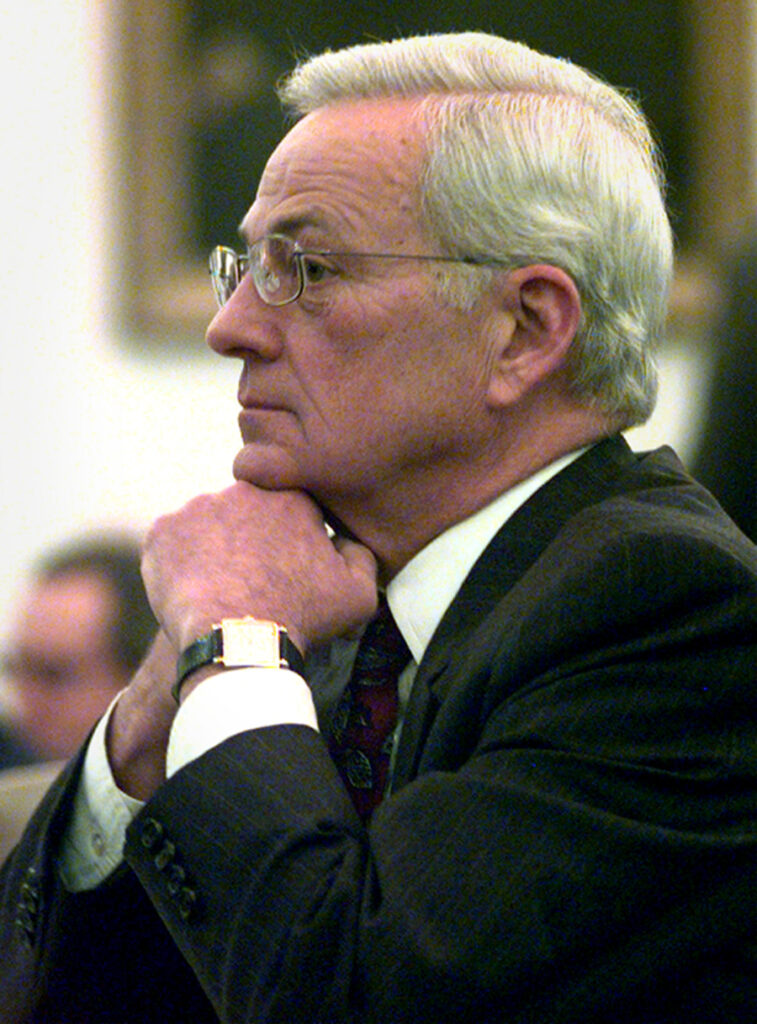
Leading by Example Makes Change Real
Leading by Example Makes Change Real
Posted On: Friday, August 14, 2020

Photo: Treasury Secretary Paul H. O’Neill appears before the House Ways and Means Committee, February 2001. Wikimedia Commons.
The pandemic’s challenges escalate pressures on company leadership at every level. Leaders who ask questions, listen and genuinely value employees make it easier for employees to do their best work. The most powerful tool of leadership is leading by example.
In the next few months, I’ll be looking for inspiring leadership examples to share with you. Former Alcoa chairman and CEO Paul H. O’Neill is a great place to start. For those not familiar with his leadership legacy, below is a column I wrote about him for Business Ethics Magazine. O’Neill’s mindset about leadership resulted in a culture transformation. It also fueled a very successful business turnaround.
Reprinted with permission from Business Ethics Magazine where it was originally published
Remembering the Leadership Legacy of Paul H. O’Neill
May 28, 2020
by Gael O’Brien
Paul H. O’Neill, former U.S. Treasury Secretary and former chairman and CEO of Alcoa had a clear point of view about how to achieve organizational excellence. From the time he was a teenager working construction in Alaska, he was a collector of ideas and observations about human behavior.
He died in April of cancer. I had the privilege of spending several hours interviewing him one summer afternoon in 2009. His beliefs about leadership illuminate the “new normal” many of us hope will emerge out of the distress and uncertainty of COVID-19.
Focus on How Leaders Impact Employees
I asked O’Neill what it was about his construction experience that so sensitized him to people. “I remembered,” he answered, “what it was like to be a very low-level employee and feel a lack of direction and lack of caring from people above me in the chain of command.”
Over four administrations, he worked primarily in the Office of Management and Budget where he became Deputy Director. At International Paper Company his roles included CFO and president.
He described how his career had influenced his ideas about leadership when he became Alcoa CEO in his 50s:
“I tried never to forget what it was like to be at the end of the chain. I wanted to remedy all those things I found so distasteful about working in … an environment that whatever the leader cared about, there was the sense that it wasn’t me. I didn’t want to be that person. I didn’t think it was possible to achieve greatness in an organization where the people didn’t know that there was a values-based culture, where we not only espoused values but we live by them.”
Every organization where he’d worked, he said, claimed “people are our most important assets.” However, it was hard to see tangible evidence to justify people were valued. He came to Alcoa wanting to work in a way so “it was possible to create an environment where people are never hurt at work.”
Three Propositions
His notion of leadership started with the idea great organizations always have three propositions every person in them can say yes to daily without reservation:
- “I am treated with dignity and respect every day by everyone I encounter…without regard for (my) rank, educational attainment, position, ethnicity, race or gender;”
- “I am given the things I need — education, training, encouragement – so I can make a contribution that gives meaning to my life;” and
- “People that I respect recognize me for what I do.”
He believed that for employees to feel work was meaningful to their life, they needed to see that values mattered in every job in the organization. He said that he wanted employees to feel they worked for a company that cared about people, cared about what it does and cared about its impact on communities. O’Neill enlisted his team to create that kind of environment.
He was convinced “that if we paid endless attention to the important non-financial measures of our enterprise, that the financial measures by definition would be great.” His financial track record at Alcoa proved him right. “Keeping score,” he said, “is not the same as producing the score.”
Institutionalizing Values
O’Neill worked to institutionalize values. They were a central part of his leadership message as were actions to reinforce them. “This new CEO,” he said of himself, “articulates values and when he finds things that don’t square with the values, he does something about it.” It doesn’t have any limits, he told me. “It applies to (the CEO) and everyone else in the organization.”
He described teachable moments of values in action that telegraphed to the organization change was happening, including:
- learning in his first week that Alcoa belonged to a golf club not admitting women or blacks, he told the club Alcoa would drop its membership; the club changed its policies;
- informing New York’s environmental commission he’d learned an engineer had lied about water contamination results, O’Neill accepted responsibility as CEO; and
- insisting safety accidents and corrective actions be posted on an internal internet within 24 hours so globally, every plant was accountable and learned from others. (Accidents per 100 employees decreased from 1.86 to 0.2 in his 12 years, impacting current safety focus.)
He chose to work in an open cubicle. Trappings didn’t interest him. Helping company leadership understand how employees felt in their organization did. He supported the value of employee surveys. He noticed that as safety performance improved, it began to be reflected in the dimensions of other things being tested.
A Leader’s Vision
His business acumen covered many areas. However, he knew people were the drivers of business success and what they felt and thought mattered. While he led Alcoa’s successful financial turnaround, his focus on a values-based culture enabled work to be more meaningful and employees more engaged.
Near the end of our interview, he posed the question:
“If you are elected to be the CEO of an organization…why wouldn’t you begin immediately with a vision for the organization and the people in it? Why wouldn’t your leadership be about creating a wonderful fulfilling organization that is not about money? Money is a consequence not an object.”
The challenge of Paul O’Neill’s leadership legacy, as we move through the pandemic and the rebuilding work of organizations, is “why wouldn’t you…?”
Posts by Category
Archive
Most Recent
Transparent & authentic, insightful, seasoned with organizational knowledge, purposeful & engaging, Gael O’Brien takes her audiences on a journey of ethical exploration that is thought-provoking. She creates the needed disturbance that invites personal and professional growth. Gael carries the noble voice of humanity’s hopefulness.
